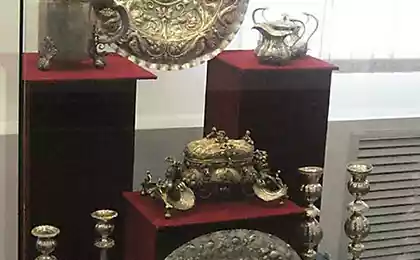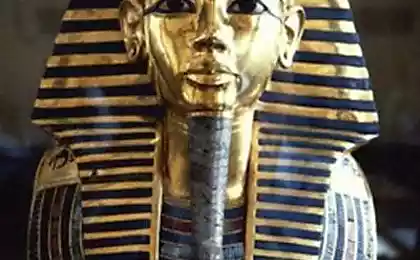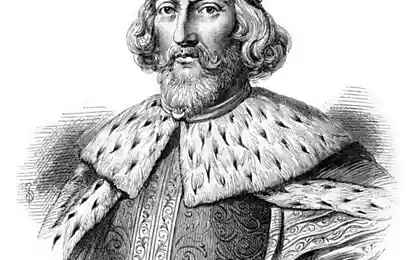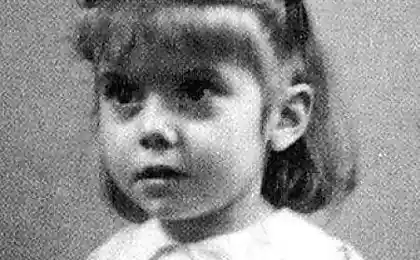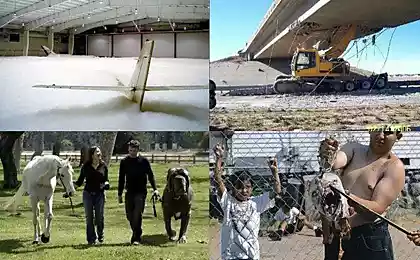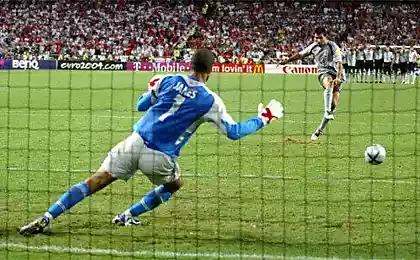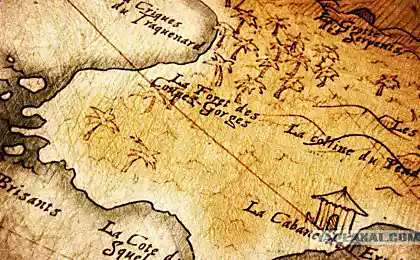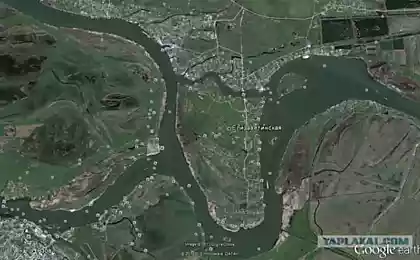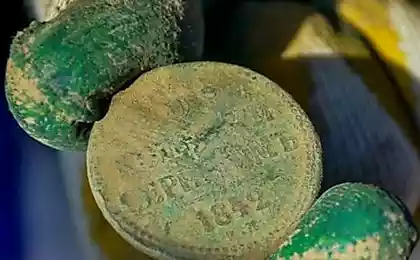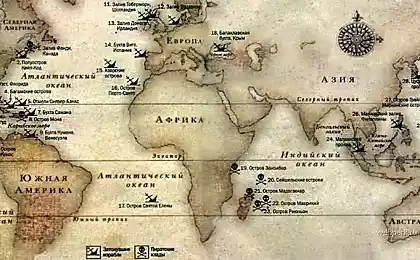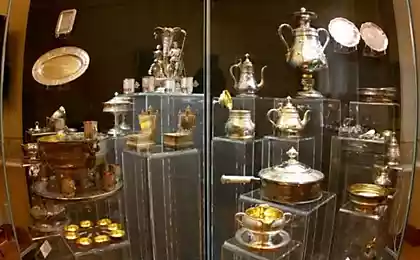562
As my son and I found a treasure
Hello, SW. Komrad! I was lucky enough to go with her son from the category of hunters in kladokopateli: the first time in over a year fell a treasure search.
And it was so. At the end of trouble in the country, the son begged his wife in honor of February 23 and a half hours to dig in the near field. Since last year, it's worth waiting for millet plowing: no dirt, the soil is sandy, walking is a pleasure. Previously there has been raised a few dimes and two years 1928-30 bilona the same period. Since, according to pre-war maps on this site and no buildings nearby, we were walking not tight, just on the edge of the field, waiting simply be removed.
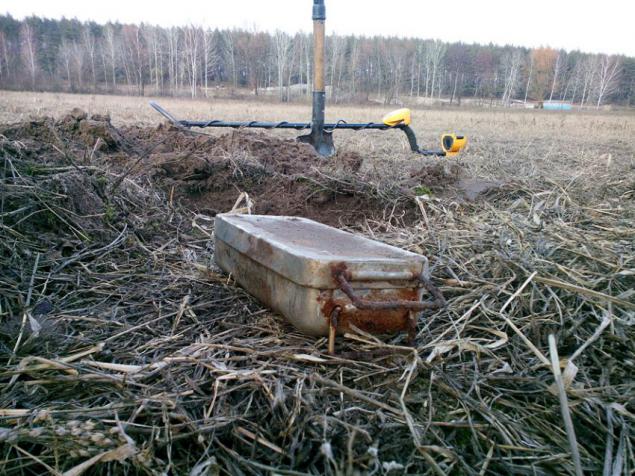
Hinted at the prospect is that all the coins have been raised and Piglet 5x3 meters. In general, we are back to half-heartedly, so to speak, for the sake of "popikat."
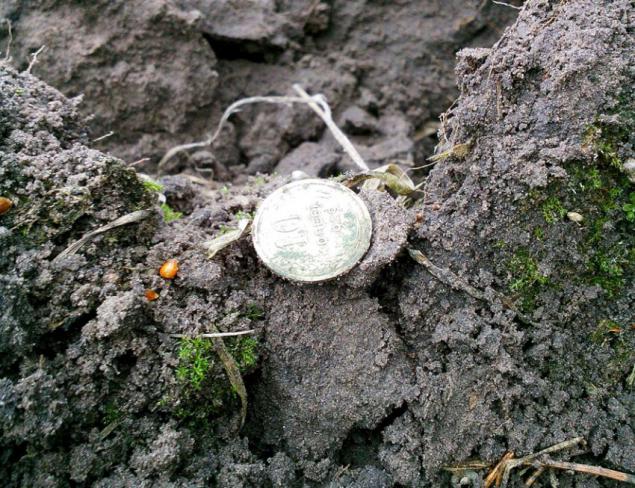
At the old place once climbed "advice": again yes bilony noses 10 and 20 cents 1928-1930 period. In total, on the patch, which is expanded to the size 5h30 meters, we picked up a dozen nickels, 4 - desyatikopeechnyh dvadtsatikopeechnyh and two coins. All -1928-1930 years. As it became clear, it was plowed purse. In addition, this same area of the field is still pleased with the two coins dimes and 1880? 1896 penny that we add the same enthusiasm.
However, not on the koshelechke my story. Knocking "fruitful" section, we went down the field on the bald patches among last year's millet, which is the owner of a poor harvest has decided not to clean up, and dug in the spring. Son, "ran" on nastrel PCA, I 20 cents in 1932. A few meters from "extreme" finds suddenly appeared clear, but deep coin signal (this is my Asya publishes a large copper coin or rusty iron foil).
At a depth of about 80 cm. To meters, I came across the cover, it seemed to me then, some boxes of stainless steel.
He called his son and said, jokingly: "GOLD want?».
- Of course I do, - he said, skeptical glance at the bottom of the excavated pit.
After a couple of minutes to the surface it was removed old chrome sterilizer for medical syringes.
- Weighty - I stated, still not believing that it may be something.
Next, followed by a silent scene, during which the head of each of us spun only one - "Is really a treasure?».
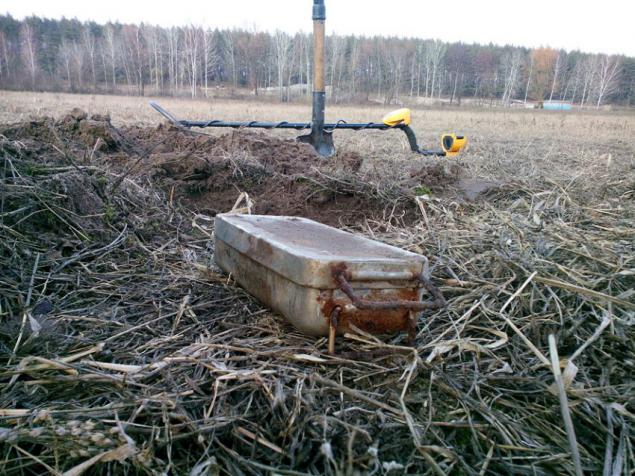
All doubts disappeared as soon as I opened the lid: on top of old, partially decayed tissue in the form of long sausages were old wristwatch. Slightly torn fabric, our views have opened gold coins.
- The money, in my opinion !, ducats - I said, and at the time when his son was ready to scream with joy, he added - but not the same as paper.
Alas - Bix appeared clogged prewar gold coins. Nevertheless, this does not mood dropped. Cheerfulness was provided.
Extracting gold coins, it was decided at home, soak a little distilled water, so as not to damage it. The road is 30 km. to give home, as well as household chores before you start dismantling treasure - seemed like an eternity. After all, what was at the bottom, we did not know. And this uncertainty gave imagination.
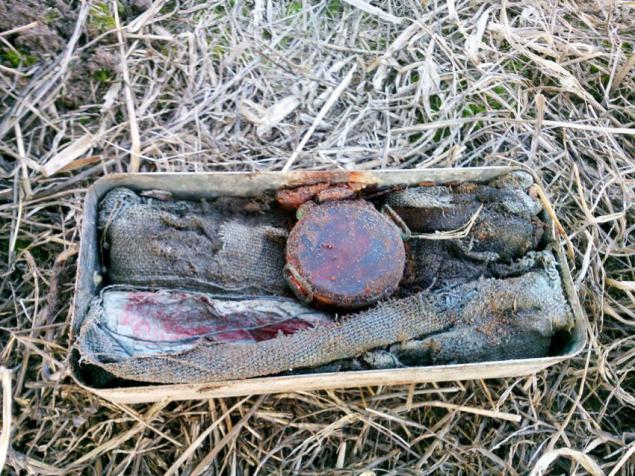
As it turned out, the money has been carefully sewn into a belt made of burlap four tight twisting. On the same day we still waiting for a little surprise bonus in the form of ... a party card and identification officers of the Red Army. This is perhaps the - most valuable thing because allowed the identification of the owner of the treasure, and even the time of his favorites.
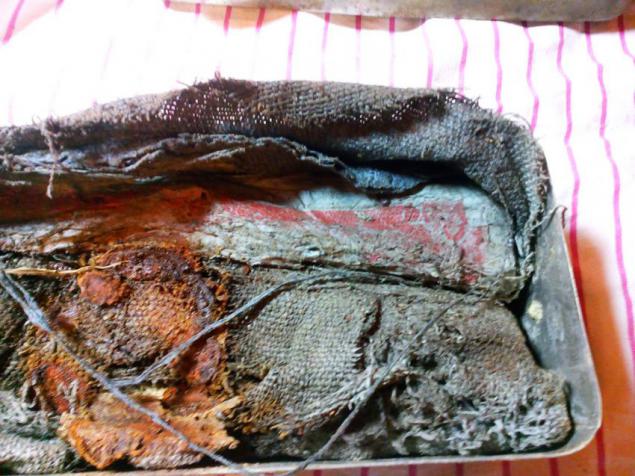
Such here sausage (twisting of the money in burlap) wore a Red Army officer
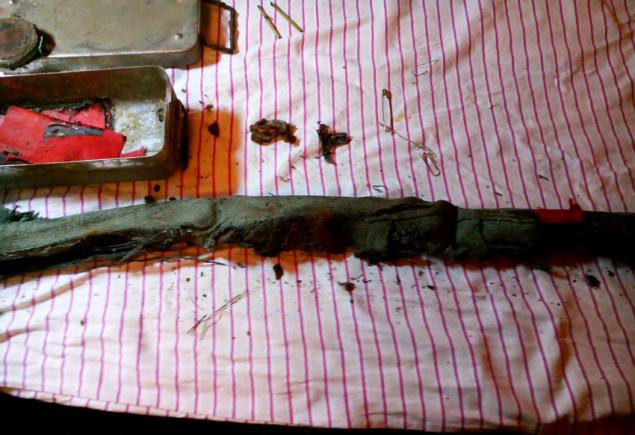
That's all the contents of the casket. Against the background of tight monetary twists two matches absolutely sparingly look
The owner turned out to be Jewish, the administrative officer of the Red Army service Evdeevich Yaakov Weiner, born in 1908. Through resource "The feat of the people" unexpectedly discovered that Jacob Evdeevich survived grinder Kiev boiler and rose to the rank of captain, was awarded in 1944 the medal for "Military Merit" and in 1945 the Order of the Red Star. Just found out that this military bandsman was wounded twice in August 1941 and in 1944.
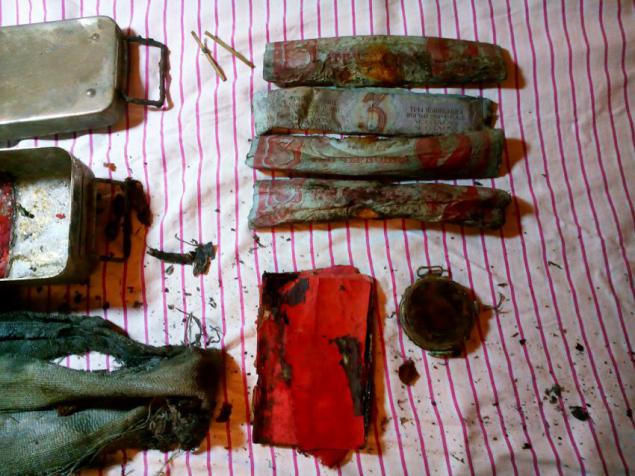
Membership card, it seems, on the edges covered with blood ...
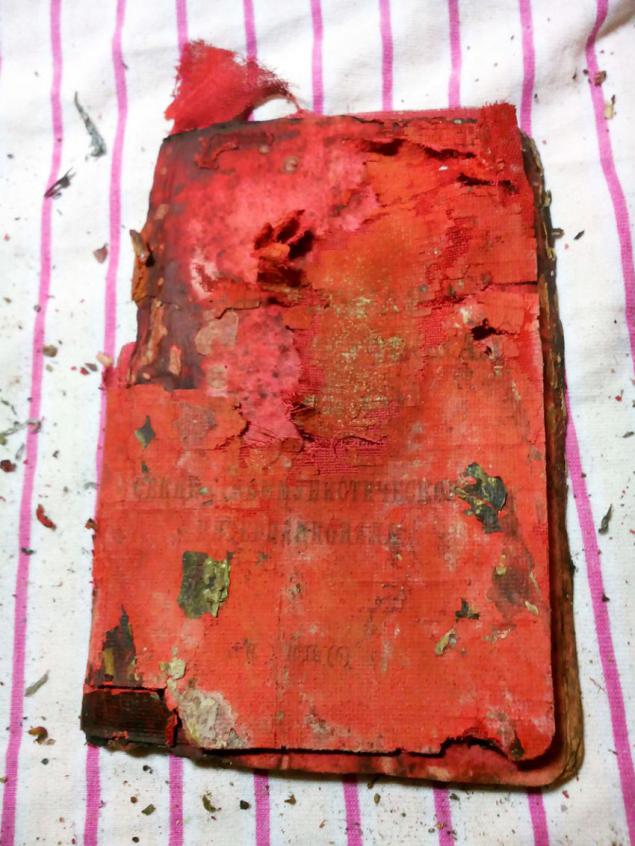
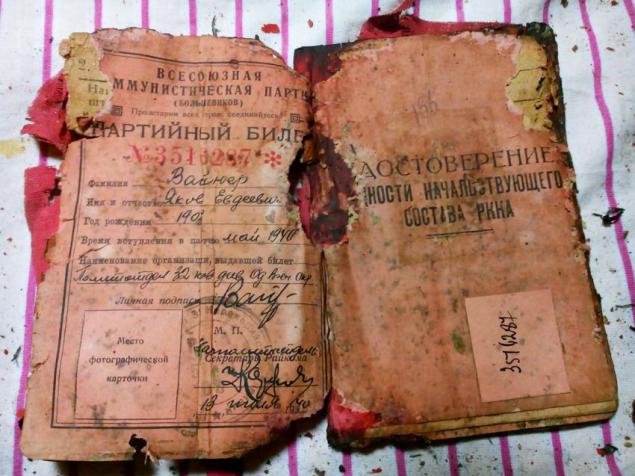
Comparing what we found out the history of the area, I came to the conclusion that in late August 1941 in the district Zolotonosha Yaakov Weiner, being wounded, was surrounded ("Kyiv pot"). And, obviously, not hoping to go to his own, at the same time - the end of August 1941, buried in one of the few hills once marshland, everything of value, as well as documents.
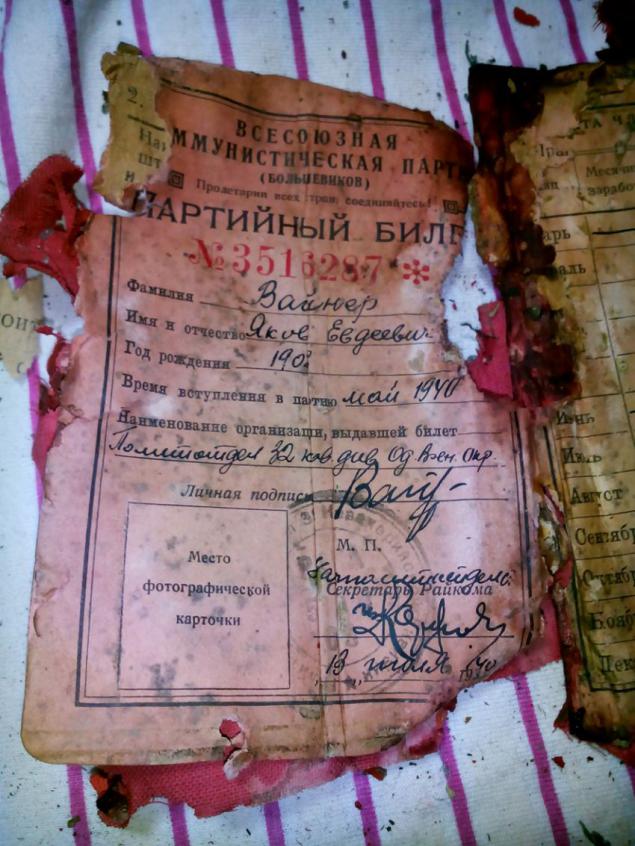
Was it his own money, or state-owned, now we can only guess. In total, there were Bikse wristwatch "Kirov" 91 bill is three gold pieces, that is, 273 gold pieces, or 2,730 rubles, membership card, certificate of an officer and somehow two matches.
My son was born the idea to restore the clock to find the family of Jacob Viner (if any) and to transmit them together with the documents to them.
That's all, do not judge strictly, the pictures did phone. Since time was short, there is no photo of nature, and most of the photos were taken at home during the autopsy.
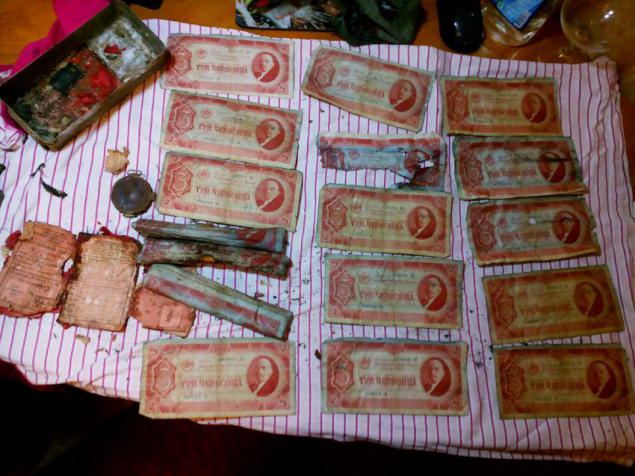
Source: klads.org
And it was so. At the end of trouble in the country, the son begged his wife in honor of February 23 and a half hours to dig in the near field. Since last year, it's worth waiting for millet plowing: no dirt, the soil is sandy, walking is a pleasure. Previously there has been raised a few dimes and two years 1928-30 bilona the same period. Since, according to pre-war maps on this site and no buildings nearby, we were walking not tight, just on the edge of the field, waiting simply be removed.

Hinted at the prospect is that all the coins have been raised and Piglet 5x3 meters. In general, we are back to half-heartedly, so to speak, for the sake of "popikat."

At the old place once climbed "advice": again yes bilony noses 10 and 20 cents 1928-1930 period. In total, on the patch, which is expanded to the size 5h30 meters, we picked up a dozen nickels, 4 - desyatikopeechnyh dvadtsatikopeechnyh and two coins. All -1928-1930 years. As it became clear, it was plowed purse. In addition, this same area of the field is still pleased with the two coins dimes and 1880? 1896 penny that we add the same enthusiasm.
However, not on the koshelechke my story. Knocking "fruitful" section, we went down the field on the bald patches among last year's millet, which is the owner of a poor harvest has decided not to clean up, and dug in the spring. Son, "ran" on nastrel PCA, I 20 cents in 1932. A few meters from "extreme" finds suddenly appeared clear, but deep coin signal (this is my Asya publishes a large copper coin or rusty iron foil).
At a depth of about 80 cm. To meters, I came across the cover, it seemed to me then, some boxes of stainless steel.
He called his son and said, jokingly: "GOLD want?».
- Of course I do, - he said, skeptical glance at the bottom of the excavated pit.
After a couple of minutes to the surface it was removed old chrome sterilizer for medical syringes.
- Weighty - I stated, still not believing that it may be something.
Next, followed by a silent scene, during which the head of each of us spun only one - "Is really a treasure?».

All doubts disappeared as soon as I opened the lid: on top of old, partially decayed tissue in the form of long sausages were old wristwatch. Slightly torn fabric, our views have opened gold coins.
- The money, in my opinion !, ducats - I said, and at the time when his son was ready to scream with joy, he added - but not the same as paper.
Alas - Bix appeared clogged prewar gold coins. Nevertheless, this does not mood dropped. Cheerfulness was provided.
Extracting gold coins, it was decided at home, soak a little distilled water, so as not to damage it. The road is 30 km. to give home, as well as household chores before you start dismantling treasure - seemed like an eternity. After all, what was at the bottom, we did not know. And this uncertainty gave imagination.

As it turned out, the money has been carefully sewn into a belt made of burlap four tight twisting. On the same day we still waiting for a little surprise bonus in the form of ... a party card and identification officers of the Red Army. This is perhaps the - most valuable thing because allowed the identification of the owner of the treasure, and even the time of his favorites.

Such here sausage (twisting of the money in burlap) wore a Red Army officer

That's all the contents of the casket. Against the background of tight monetary twists two matches absolutely sparingly look
The owner turned out to be Jewish, the administrative officer of the Red Army service Evdeevich Yaakov Weiner, born in 1908. Through resource "The feat of the people" unexpectedly discovered that Jacob Evdeevich survived grinder Kiev boiler and rose to the rank of captain, was awarded in 1944 the medal for "Military Merit" and in 1945 the Order of the Red Star. Just found out that this military bandsman was wounded twice in August 1941 and in 1944.

Membership card, it seems, on the edges covered with blood ...


Comparing what we found out the history of the area, I came to the conclusion that in late August 1941 in the district Zolotonosha Yaakov Weiner, being wounded, was surrounded ("Kyiv pot"). And, obviously, not hoping to go to his own, at the same time - the end of August 1941, buried in one of the few hills once marshland, everything of value, as well as documents.

Was it his own money, or state-owned, now we can only guess. In total, there were Bikse wristwatch "Kirov" 91 bill is three gold pieces, that is, 273 gold pieces, or 2,730 rubles, membership card, certificate of an officer and somehow two matches.
My son was born the idea to restore the clock to find the family of Jacob Viner (if any) and to transmit them together with the documents to them.
That's all, do not judge strictly, the pictures did phone. Since time was short, there is no photo of nature, and most of the photos were taken at home during the autopsy.

Source: klads.org


